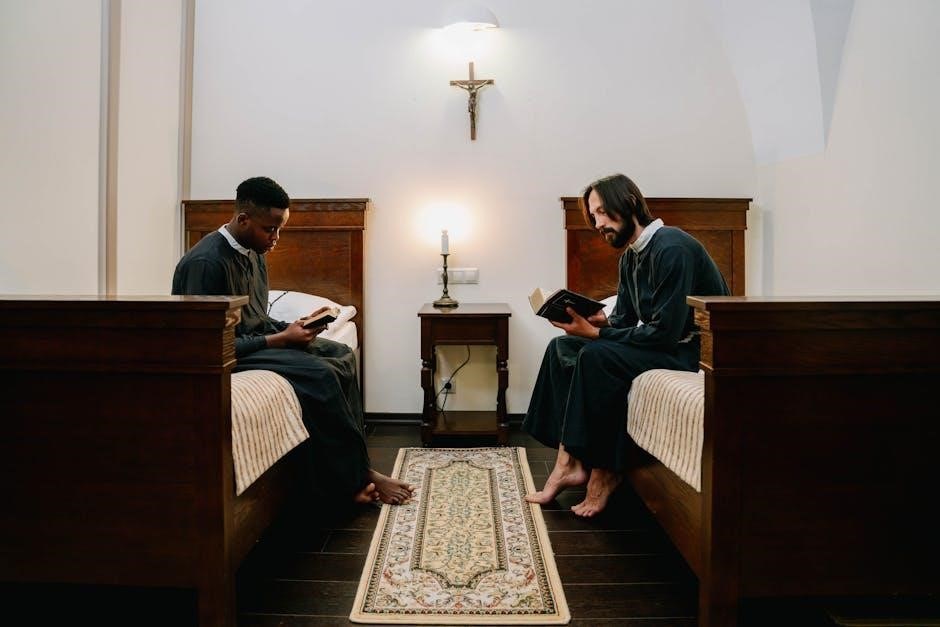Catholic Bible study is a sacred journey into God’s Word, deepen faith, and explore the rich traditions of the Church; Using study guides and approved translations, Catholics engage in individual or group settings, fostering spiritual growth and community. Through prayer, reflection, and structured approaches, participants uncover the Bible’s timeless truths, applying them to daily life and strengthening their relationship with Christ.
Importance of Bible Study for Catholics
Bible study is essential for Catholics to deepen their faith and understand God’s plan for humanity. It provides a foundation for spiritual growth, enabling believers to apply scriptural teachings to daily life. Through Bible study, Catholics can gain insights into Church doctrine, fostering a stronger connection to the Magisterium and Tradition. Regular engagement with Scripture, guided by prayer and reflection, helps individuals discern God’s will and live authentically as followers of Christ. This practice also strengthens community bonds, especially in group settings, where shared reflections and discussions enrich personal understanding. Ultimately, Bible study empowers Catholics to embrace their faith more fully and live in accordance with God’s Word;
Purpose of a Catholic Bible Study Guide
A Catholic Bible study guide serves as a valuable tool for navigating Scripture, offering structured lessons and insights. Its purpose is to provide background information, discussion questions, and prayer prompts, helping individuals or groups engage deeply with the Word of God. These guides often align with Church teachings, ensuring fidelity to Tradition and the Magisterium. They facilitate personal reflection and communal discussion, making complex biblical concepts accessible. By incorporating commentary and faith applications, study guides empower Catholics to live out their faith authentically, fostering spiritual growth and a deeper connection to Christ. They are particularly useful for parish groups, individual study, or programs like RCIA, enriching the faith journey of all participants.

Choosing the Right Catholic Bible
Selecting a Catholic Bible involves ensuring it includes the Deuterocanonical books and has an imprimatur. Approved translations like NJB, CEV, or GNB are recommended for accurate understanding and navigation of the sacred text.
Catholic Approved Translations
When selecting a Catholic Bible, it’s essential to choose a translation approved by the Church. Translations like the New Jerusalem Bible (NJB), Christian Community Bible (CCB), Good News Bible (GNB), and the New American Bible (NAB) are widely recognized and recommended. These versions have received the imprimatur, ensuring they align with Catholic doctrine and provide accurate interpretations of sacred Scripture. The NAB, in particular, is noted for its clarity and is often used in liturgical settings. These translations are ideal for personal study, group discussions, and deeper theological exploration, offering readers a reliable and faithful understanding of God’s Word.
Understanding the Structure of the Catholic Bible
The Catholic Bible is structured into two main testaments: the Old Testament and the New Testament. The Old Testament includes 46 books, comprising the Law, Historical Books, Wisdom Literature, and Prophets. The New Testament contains 27 books, including the Gospels, Epistles, and Revelation. Unique to the Catholic Bible are the Deuterocanonical books, such as Tobit, Judith, and Maccabees, which are not found in Protestant Bibles. This comprehensive structure reflects the fullness of God’s revelation, providing a rich tapestry of salvation history. Understanding this organization enhances Bible study, as it reveals the interconnectedness of themes, events, and divine plans. This structure also aids in contextualizing passages and applying them to Catholic teachings and traditions.

Preparation for Effective Bible Study
Effective Catholic Bible study begins with prayer, reflection, and a willingness to engage deeply with Scripture. Gather materials like a Catholic-approved Bible, study guides, and commentaries. Set intentions to seek spiritual growth and apply God’s Word to daily life, fostering a mindset open to divine revelation and guidance.
Prayer and Reflection in Bible Study
Prayer and reflection are cornerstone practices in Catholic Bible study, fostering a deeper connection with God’s Word. Begin each session with prayer, seeking the Holy Spirit’s guidance to illuminate understanding. Reflection involves meditating on Scripture, allowing its truths to resonate personally and spiritually. This practice encourages Catholics to internalize the teachings, applying them to everyday life. Many guides recommend dedicating time after reading to reflect on how the passages speak to individual circumstances. Ending with prayer reinforces the lessons learned, solidifying faith and nurturing a relationship with Christ. Through prayerful reflection, Catholics can embrace the transformative power of Scripture, finding comfort, wisdom, and spiritual renewal. This sacred dialogue with God enriches study, making it a meaningful and life-changing experience.

Using Study Guides and Commentaries
Study guides and commentaries are invaluable tools for Catholic Bible study, offering structured approaches to understanding Scripture. These resources provide background information, historical context, and theological insights, helping participants grasp complex teachings. Many guides include discussion questions, reflection points, and practical applications, fostering deeper engagement with the text. Commentaries, often written by scholars, shed light on difficult passages, ensuring interpretations align with Catholic doctrine. By using these aids, individuals and groups can explore the Bible’s richness without feeling overwhelmed. Guides like the New American Bible or The Great Adventure Bible Timeline are particularly popular, as they integrate faith and learning. These tools not only enhance comprehension but also encourage believers to apply biblical truths to their lives, deepening their relationship with God and the Church.

Key Themes in Catholic Bible Study
Key themes include Salvation, God’s plan, and the role of the Church. Study guides emphasize the Eucharist, Mary’s role, and living a faith-centered life, aligning Scripture with Catholic teachings and traditions to deepen spiritual understanding and application.
The Role of Tradition and Magisterium
In Catholic Bible study, Tradition and the Magisterium are essential for interpreting Scripture. Tradition, as a lived faith passed through the Church, complements the Bible, providing context and depth. The Magisterium, the Church’s teaching authority, ensures fidelity to apostolic teachings. Study guides often reference the Catechism of the Catholic Church, which harmonizes Scripture and Tradition. This approach safeguards against misinterpretations, ensuring biblical truths align with Catholic doctrine. By integrating Tradition, Catholics gain a richer understanding of biblical passages, such as the Eucharist and Mary’s role. This unity of Scripture and Tradition fosters a holistic faith, guiding believers to live out God’s Word authentically in their lives.
Salvation and the Plan of God
Salvation is central to Catholic Bible study, revealing God’s plan to reconcile humanity with Himself. Through Scripture, Catholics discover the unfolding narrative of salvation history, from creation to redemption. Jesus Christ, as the Son of God, is the fulfillment of this plan, offering humanity salvation through His life, death, and resurrection. The Bible study guides emphasize the sacraments and the Church as vital means of receiving God’s grace. Catholics are called to participate in this divine plan by living a life of faith, love, and service. Understanding salvation deepens one’s relationship with God and inspires a commitment to sharing the Gospel with others. This theological foundation is a cornerstone of Catholic Bible study, guiding believers toward eternal life.

Bible Study Methods

Catholic Bible study methods include LECTIO DIVINA, scriptural analysis, and faith-sharing discussions. These approaches deepen understanding and foster spiritual growth through prayerful engagement with God’s Word.
Individual Study Techniques
Individual Catholic Bible study techniques emphasize personal reflection and prayerful engagement. Begin with LECTIO DIVINA: read, reflect, pray, and contemplate Scripture. Set aside dedicated time for quiet meditation, allowing God’s Word to resonate deeply. Use Catholic study guides to gain insights and context, ensuring fidelity to Church teachings. Highlight or underline meaningful passages, and jot down reflections in a journal. Apply scriptural truths to daily life, seeking to grow in holiness and understanding. Regularly pray for the Holy Spirit’s guidance to illuminate the text. This personal approach fosters a deeper, transformative relationship with God’s Word, enriching faith and inspiring action in accordance with Catholic traditions and values.
Group Study Dynamics
Group Catholic Bible study fosters a sense of community and shared faith, enriching individual understanding through collective insights. Participants engage in lively discussions, guided by Catholic study guides and commentaries, ensuring fidelity to Church teachings. A facilitator often leads the group, maintaining focus and encouraging active participation. Group dynamics promote accountability and support, helping members stay committed to their faith journey. Sharing personal reflections and experiences deepens connections and broadens perspectives, while collaborative learning enhances comprehension of Scripture. Group study also provides opportunities for prayer, shared worship, and mutual encouragement, creating a vibrant environment for spiritual growth. This communal approach complements individual study, offering a balanced and transformative experience rooted in Catholic traditions and values.

Resources for Catholic Bible Study
Explore Catholic Bible study guides, eBooks, and online tools like the New American Bible Revised Edition, The Great Adventure Bible Timeline, and MyBible modules for deeper engagement.
Recommended Study Guides and eBooks
Discover a variety of Catholic Bible study guides and eBooks designed to deepen your understanding of Scripture. Resources like the New American Bible Revised Edition offer detailed commentary and study notes, while The Great Adventure Bible Study Guide provides a structured approach to exploring the Bible’s narrative. Online platforms and apps, such as MyBible or Laudate, also offer convenient access to study materials. These guides often include prayer prompts, reflection questions, and historical context to enhance your study experience. Whether you prefer digital or print formats, these resources empower you to engage with God’s Word in a meaningful and transformative way, fostering spiritual growth and a deeper connection to Catholic teachings.
Online Tools and Apps for Bible Study
Enhance your Catholic Bible study with a variety of online tools and apps designed to deepen your engagement with Scripture. Apps like MyBible and Laudate offer digital versions of Catholic-approved Bible translations, study guides, and devotional content. These platforms often include interactive features such as note-taking, prayer journals, and sharing capabilities to facilitate group study. Additionally, apps like The Great Adventure provide structured reading plans, such as a 365-day journey through the Bible, complete with daily passages and insights. Online resources also offer access to commentaries, videos, and audio lectures, making it easier to explore the richness of Catholic teachings. These tools empower individuals to study the Bible anytime, anywhere, fostering a deeper connection to God’s Word and strengthening their faith journey.

Addressing Common Questions
Catholic Bible study guides clarify common questions about doctrine, interpretation, and applying Scripture to daily life, offering resources to deepen understanding and strengthen faith.

Understanding Bible Doctrine
Understanding Bible doctrine is central to Catholic Bible study, as it provides the theological foundation for faith. Catholic study guides emphasize the importance of interpreting Scripture within the context of Church Tradition and the Magisterium. Key doctrines such as the Trinity, the Eucharist, and the role of Mary are explored through Scriptural references and official Church teachings. These guides also address common questions about salvation, grace, and the sacraments, offering clarity and depth. By prayerfully reflecting on God’s Word and its application to life, Catholics deepen their understanding of divine truths. The guides ensure that Scriptural interpretation aligns with Catholic beliefs, fostering a balanced and faithful approach to Bible study.
Applying Scripture to Daily Life
Applying Scripture to daily life is a vital aspect of Catholic Bible study, enabling believers to live out their faith meaningfully. Catholic study guides provide practical tools, such as reflection questions and action steps, to help individuals connect biblical teachings with real-life challenges. These resources emphasize how Scriptural lessons on forgiveness, love, and humility can transform everyday decisions and relationships. By prayerfully meditating on God’s Word, Catholics are encouraged to embrace its relevance in modern contexts, such as family life, work, and community service. The guides also offer insights into how to apply moral teachings and virtues, fostering a life rooted in Gospel values. This application not only deepens personal faith but also equips Catholics to share Christ’s love in their daily interactions, becoming His witnesses in the world.
Catholic Bible study concludes as a transformative journey, deepening faith and fostering community. Through prayer and reflection, it enriches lives, guiding believers to live Gospel values.
The Transformative Power of Bible Study
Catholic Bible study holds the power to transform lives by deepening faith and fostering a personal relationship with God. Through prayerful reflection and guided study, participants encounter the living Word of God, which illuminates their path and strengthens their spiritual journey. The Holy Spirit works through Scripture to bring comfort, wisdom, and renewal, enabling believers to apply its teachings in daily life. Bible study also nurtures a sense of community, as Catholics gather to share insights and support one another in living out their faith. This transformative experience not only enriches individual lives but also empowers Catholics to witness Christ’s love in the world, embodying the Gospel’s call to holiness and service.
Encouragement for Ongoing Study
Catholic Bible study is a lifelong journey of faith and discovery. Encouraging ongoing study involves embracing the rich resources available, such as study guides and eBooks, which provide deeper insights into Scripture. The supportive community of fellow Catholics, whether in group settings or through online tools, fosters accountability and shared growth. Reflecting on the transformative power of God’s Word, believers are inspired to persist in their study, knowing it strengthens their relationship with Christ. The Holy Spirit guides this journey, illuminating the path and nurturing a deeper understanding of Catholic teachings. By prioritizing regular Bible study, Catholics can continue to grow in faith, applying its wisdom to everyday life and drawing closer to God’s plan for their lives.
